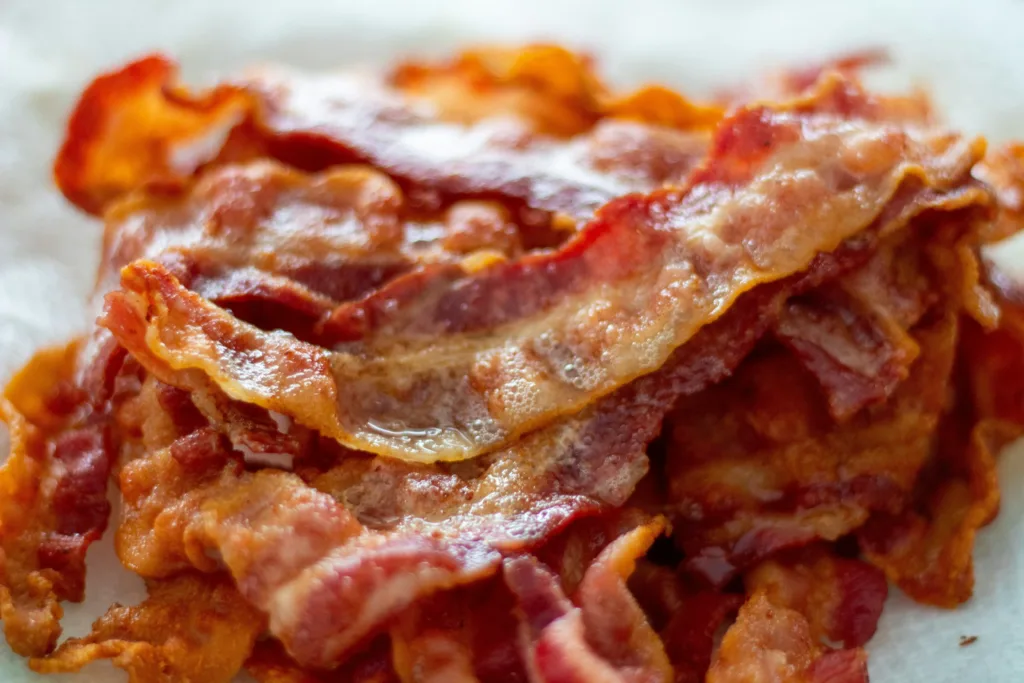Turkey bacon has a bit of a reputation – often seen as the “healthier” swap when pork bacon feels too indulgent. But is that label earned, or is it just clever marketing? With more people trying to eat cleaner, lower their saturated fat, or avoid red meat altogether, turkey bacon has become the go-to for everything from breakfast scrambles to low-carb snacks. That said, the truth behind its health halo is a bit more complicated than most grocery aisle packaging suggests.
At ReciMe, we’re all about making food decisions easier, not more confusing. Whether you’re planning meals for muscle recovery, heart health, or just trying to feel better day to day, knowing what you’re putting on your plate matters. So if turkey bacon’s been showing up in your wraps, salads, or breakfast bowls, let’s unpack what it’s actually doing for your body – and what it’s not. Grab ReciMe now, power up your nutrition, and let’s explore whether turkey bacon earns its healthy badge.


Why Turkey Bacon Exists in the First Place
Let’s be real – turkey bacon wasn’t born out of a deep love for poultry. It showed up because people wanted bacon… without everything that comes with bacon. For decades, pork bacon held its place as the crispy, salty MVP of breakfast plates. But over time, concerns around saturated fat, cholesterol, and the whole “processed red meat = health risks” conversation started gaining ground. Suddenly, folks were looking for a way to keep the sizzle without the side of guilt.
Enter turkey bacon – the understudy that stepped in when pork bacon felt too heavy. It promised fewer calories, less fat, and a non-pork option that worked for people avoiding red meat for religious, dietary, or health reasons. Was it ever trying to be the exact same thing? Not really. It was meant to be close enough. Familiar flavor, thinner cut, quicker to crisp up – but with a lighter nutritional load. Or at least, that was the idea.
Of course, as with most “healthier” swaps, the reality turned out to be a little messier than the label. But still, turkey bacon stuck around. It gave people options, and for a lot of us, that’s all we were asking for. Something that felt like bacon, tasted kind of like bacon, and didn’t instantly trigger every wellness alarm in our brain.

The Health Halo Trap: Is It Really a “Better” Bacon?
Let’s not sugarcoat it – turkey bacon sounds healthier than pork bacon, but the gap between what people assume and what it actually delivers? Pretty wide. It’s easy to fall into the trap of thinking “turkey” equals clean eating, but in this case, the details matter more than the label.
Here’s what tends to get overlooked:
- It’s still processed: Just like pork bacon, turkey bacon is cured, flavored, and preserved to last longer and taste like the real thing. That means additives, stabilizers, and smoke flavoring are often along for the ride.
- The sodium’s no joke: Turkey bacon is high in sodium, often containing as much as pork bacon (e.g., 164 mg per slice) or more (up to 1,900 mg per 2 oz), which can exceed half the recommended daily limit of 1,500-2,300 mg.
- “Natural” doesn’t mean harmless: ‘Nitrate-free’ or ‘uncured’ turkey bacon often uses celery powder, which forms nitrites during cooking, producing nitrosamines with the same cancer-linked risks as synthetic nitrates.
- It’s not exactly nutrient-dense: Turkey bacon is low in fiber, lacks significant vitamins or minerals, and doesn’t offer much beyond protein and fat – so it’s not bringing a whole lot of value to the plate nutritionally.
- It gets a free pass way too often: Because it wears the “healthier” label, people treat it like a guilt-free food – adding it to salads, wraps, scrambles, you name it – without realizing it’s still best in moderation.
If turkey bacon’s showing up in your meal plan, that’s fine – but see it for what it is. It’s not a health food. It’s just a slightly different kind of bacon. And that’s okay, as long as you’re not giving it a health halo it didn’t earn.
Micronutrients in Turkey Bacon: A Closer Look at What’s Inside
Alright, so we’ve talked fat, calories, and sodium – but what about the smaller stuff? The quiet players. The vitamins and minerals that don’t always make headlines but still do some heavy lifting behind the scenes. Turkey bacon isn’t exactly a nutritional powerhouse, but there are a few micronutrients worth knowing about if it’s part of your plate.
Here’s what you’re getting (in small doses):
- Vitamin B12: Important for energy and brain function, turkey bacon provides about 0.15 mcg per slice (8.1 g), roughly 6% of your daily needs. Not bad, especially if you don’t eat much red meat or dairy.
- Choline: At around 14 mg per slice, turkey bacon gives you a small hit of choline – a nutrient important for memory, mood, and muscle control. Most people don’t get enough of it, so even a little helps.
- Zinc: Some brands contain trace amounts of zinc, which supports your immune system and helps with wound healing. Again, not a major source, but it’s in there.
- Selenium: Turkey in general tends to be a decent source of selenium, an antioxidant that helps protect cells from damage. In bacon form, it’s there – but not in huge amounts.
- Iron: It’s not red meat, so iron levels are lower compared to pork bacon or beef. You’ll still get a small amount, but don’t count on turkey bacon to support your iron needs.
Is it enough to make turkey bacon a solid nutritional pick? Not really. These micronutrients are more of a side note than a reason to include it regularly. But if you’re already eating a balanced diet and just want to understand what this food actually contributes – that’s the real picture. Tiny perks, not big wins.

When Turkey Bacon Does Make Sense
There are definitely moments when turkey bacon earns its spot. If you’re avoiding pork for religious or personal reasons, or trying to cut back on saturated fat but still want something smoky and crisp on your breakfast plate, turkey bacon checks those boxes. It’s not perfect, but it offers a way to scratch the bacon itch without going full pork belly.
It also works as a lower-calorie option when you’re building a meal that’s already got plenty of richness – like a cheesy wrap, an egg bake, or a loaded salad. You get the flavor without tipping the whole thing over the edge. Just keep it occasional, and think of it as an ingredient, not a foundation. It’s a supporting role, not the star.
What You Might Not Realize About Turkey Bacon
It’s easy to assume turkey bacon is a safer pick just because it isn’t red meat – but that doesn’t automatically make it a healthy food. Once you dig into how it’s made and what goes on during cooking, a few concerns start to surface.
It’s Still Processed Meat
Just like regular bacon, turkey bacon is cured, seasoned, and preserved to look and taste a certain way. That processing – especially when it involves curing agents and added flavors – puts it in the same category as deli meats, sausages, and other salty favorites that aren’t exactly praised for their health benefits. Poultry or not, it’s still been through a lot before it hits your pan.
Nitrates and Nitrites – Both Kinds Count
Whether you’re looking at a label that says “sodium nitrite” or one that highlights celery powder, the process works out pretty similarly. These preservatives can turn into nitrosamines when cooked at high heat – and those have been studied for their potential health risks. It’s one of those cases where natural doesn’t always mean harmless, especially when heat gets involved.
High-Heat Cooking Brings Its Own Issues
Let’s be honest – most of us cook turkey bacon until it’s crispy. Pan-fried, baked, microwaved – whatever method you use, that high temperature can create compounds like HCAs and PAHs. Not fun acronyms, and not something you really want building up over time, either. These are known to form in a lot of cooked meats, especially ones that brown or char.
So while turkey bacon might seem like a step up from pork, it’s not exactly a clean slate. If you’re trying to eat more mindfully, the better move might be keeping processed meats in general to a once-in-a-while category – not just swapping one version in for another.

Tips to Keep It in Your Diet (Without Letting It Take Over)
If you like turkey bacon and it fits your taste or dietary preferences, there’s no need to exile it from your kitchen forever. The key is just not letting it sneak into every meal under the assumption that it’s super healthy. Here’s how to keep it in the rotation – without letting it run the show.
- Treat it like a topping, not the main event: Use it to add flavor, not bulk. Crumble a slice over roasted veggies or stir it into a frittata instead of piling up three or four pieces on the side. A little goes a long way when you’re working with something salty and smoky.
- Go easy on the portion sizes: Two slices (about 16 g) provide roughly 60 calories and 328 mg of sodium, a reasonable amount, while half a package could significantly increase sodium and calorie intake. Keep your serving sizes small, and pair it with nutrient-dense foods – think fiber, healthy fats, and colorful produce that balance the plate.
- Pick a better version: If you can, look for brands that skip synthetic nitrates and keep the ingredient list short. “Uncured” or “nitrate-free” doesn’t automatically mean safe, but it’s often a step in the right direction.
- Watch your salt elsewhere: Turkey bacon brings enough sodium to the table on its own. So if it’s part of your meal, maybe ease up on the added salt in the eggs, skip the heavily salted toast, or go for fresh avocado instead of cheese.
- Don’t let the label do the thinking for you: Just because it says “turkey” doesn’t make it a health food. Keep the habit intentional – not automatic. It’s totally fine to enjoy it now and then. Just make sure it’s part of a bigger, balanced picture.
Turkey bacon can hang – it just doesn’t need a starring role in your weekly meal prep. Keep it in your toolbox, but use it like you use hot sauce: for flavor, not fuel.
Conclusion
Well, it’s complicated – and that’s kind of the point. Turkey bacon isn’t a magic fix for anyone trying to eat better, but it’s also not the villain some folks make it out to be. It falls somewhere in the middle. A little lighter on the calories, maybe, and not red meat, which is a win for some. But it’s still processed, still salty, and still carrying the same additives that nutrition experts keep side-eyeing.
If you’re using it sparingly – crumbled into a dish, layered into a sandwich now and then, or as a once-a-week breakfast add-on – you’re probably fine. Just don’t let the “healthier” label fool you into making it a daily thing. As with most food choices, context matters. One slice of turkey bacon isn’t going to break your diet. Eating it like it’s spinach? That’s a different story.
FAQ
1. Is turkey bacon okay to eat every day?
Technically, yes – but most dietitians would say “not ideal.” It’s still processed meat, which means regular daily use might increase your risk for some long-term health issues. Better to rotate it in, not rely on it.
2. Does turkey bacon have nitrates?
Most brands use synthetic or naturally derived nitrates to preserve it, even if they say “uncured” or “natural.” These can still form nitrosamines when cooked, which are linked to cancer risks.
3. Is turkey bacon good for weight loss?
It can be, but only in moderation. It’s lower in calories than pork bacon, which helps if you’re trying to reduce your intake – just keep an eye on the sodium and don’t let it push more nutrient-dense foods off your plate.
4. What’s the healthiest way to cook turkey bacon?
Opt for oven-baking or air-frying at moderate temperatures (below 400°F or 200°C) to achieve a crisp texture without extra oil, while minimizing the formation of harmful compounds like HCAs and PAHs. Just don’t crank the heat too high – high temps can increase harmful compound formation.
5. Is “nitrate-free” turkey bacon really better?
Somewhat. It avoids synthetic preservatives, which might make people feel better about it, but “natural” nitrates from celery powder still carry similar risks when heated. So it’s not a perfect solution, just a slightly cleaner label.
